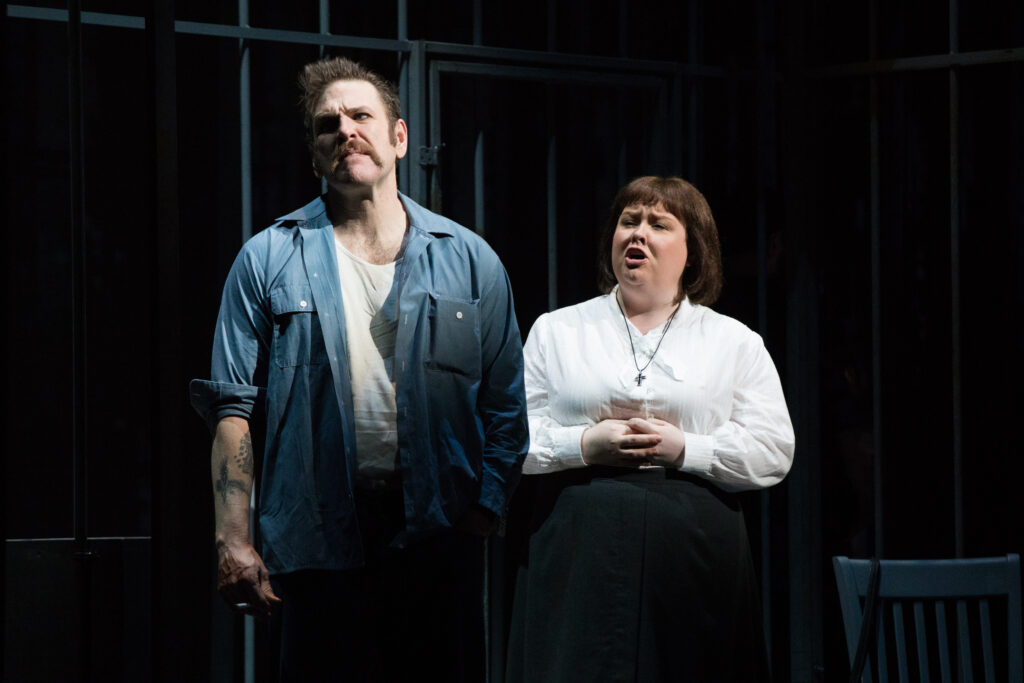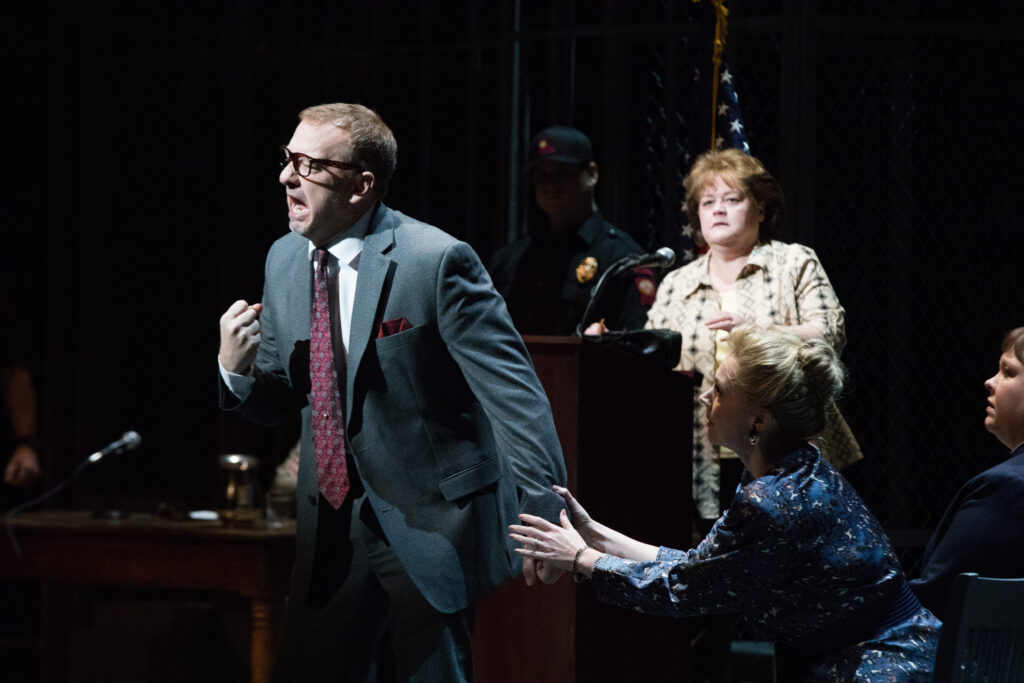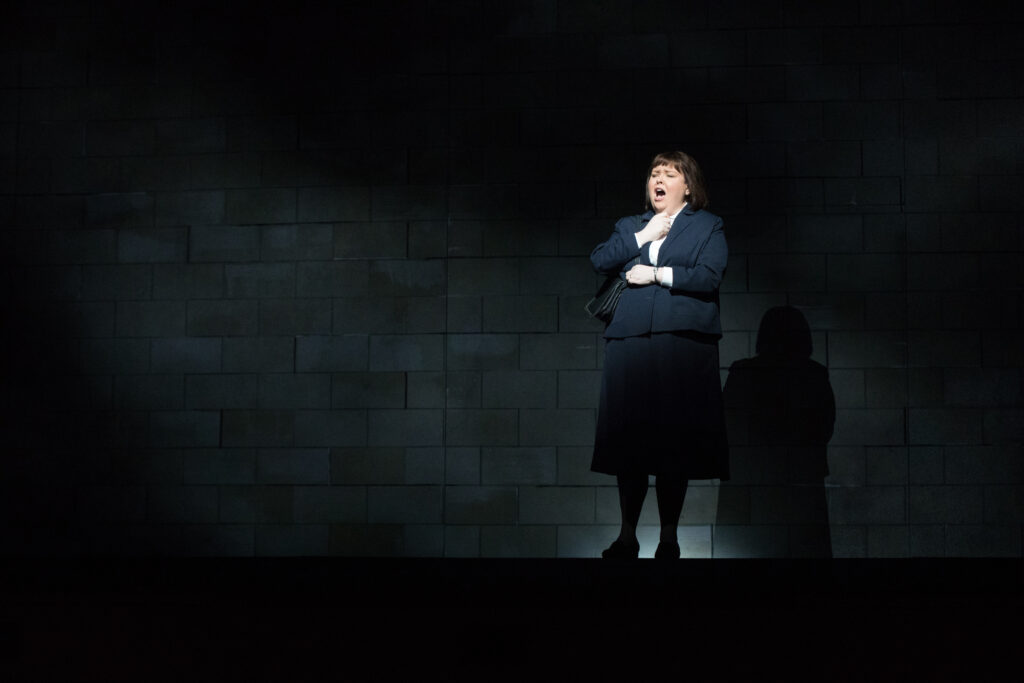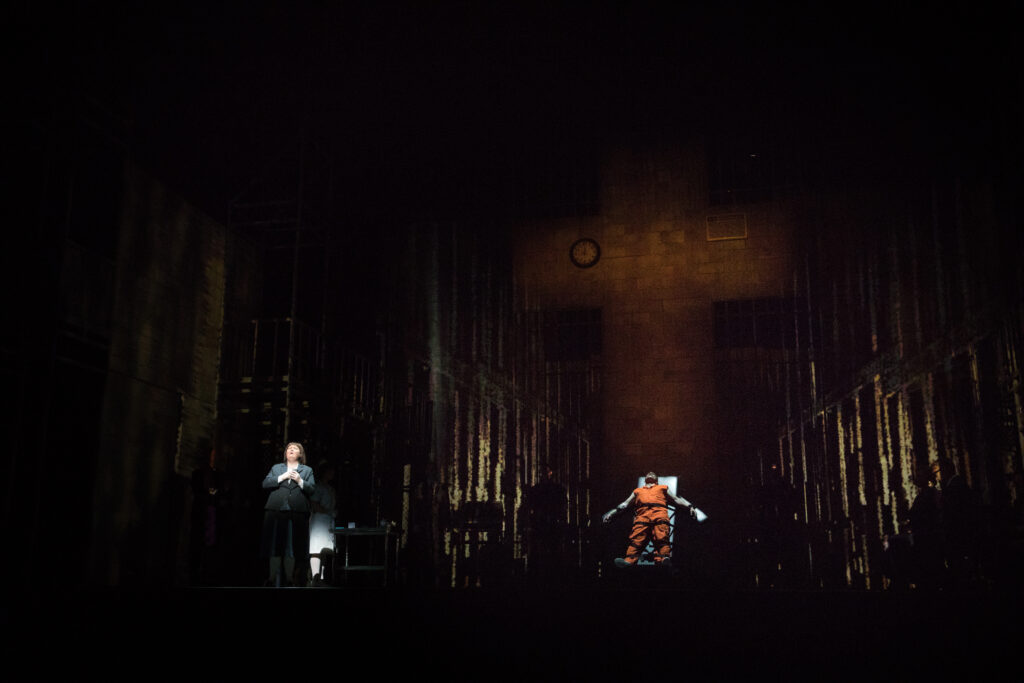As the small gathering of protesters held their ground outside the theater, an historic tableau greeted the Atlanta premiere of Jake Heggie’s Dead Man Walking this past Saturday. On the stage of the Cobb Energy Performing Arts Center, holding hands with the cast and the production team was the composer himself, as well as the real Sister Helen Prejean. The audience, which not long before had held its breath in stunned silence at the opera’s final scene, showered the creators with unabated and enthusiastic applause. As the crowds prepared to confront the growing pre-Super Bowl traffic, a palpable air of agitation clung throughout the lobby. Random dialogue covering the subject matter, the musical value of the piece, and other aspects of the production could be heard as most patrons made their way out the door. Atlanta is no stranger to Heggie’s music – it has been a mainstay of the song repertoire in our recital venues such as Spivey Hall. That said, this marked the first time the Atlanta Opera audience had the opportunity to grapple directly with the monolithic issues found in his first opera. In the case of your friends at newoutpost, while thoroughly familiar with the score through various broadcasts and the available commercial recordings of the piece, this was also our first opportunity to experience the work in the flesh, and we found the event to be extraordinarily stimulating.

Jake Heggie’s decision to set the controversial and most unsexy subject of capital punishment to music for his very first opera is inspired, and his handling of Terrance McNally’s unflinching libretto (Mr. McNally’s best work in our opinion) is nothing short of courageous. His score grips the audience, and ever since its triumphant premiere almost 19 years ago, the opera has positioned itself as the most performed American modern opera of our time.
Breaking the opera’s musical scenes into bite size pieces, we take into our hearts a good chunk of score: We are charmed by the basic and comforting quality of the hymn heard throughout the opera. We are impressed by the expressive yet formal manner with which Mr. Heggie weaves the lines of the principals during the sextet between Sister Helen, the parents of the victims and Joseph’s mother. We marvel at the concertato that emotionally drowns Sisten Helen at the end of the first act, predicting with uncanny accuracy the emotionally stifling effect of countless social media comments given simultaneous voice (already a feature of the brave new world we haven’t fully grown accustomed to since the opera’s premiere in 2000). Other sections have a way of lingering and almost tormenting the mind’s ear long after its left the theater, such as the duet between Sister Helen and Sister Rose, and the savagely powerful treatment of the Lord’s prayer juxtaposed against the stark and impersonal simplicity of the impending execution. This last scene also serves a dual purpose, as it poignantly implies the turning point in Sister Helen’s life. Suddenly, we hear the music of the prelude again and realize the opera’s genesis is a direct result of the very event that is playing out before our eyes. The final hymn (which also introduces the first act,) poetically signals the beginning of Sister Helen’s new journey in her involvement with death row convicts, their families and the families of the victims – a work that continues to this day.

That Dead Man Walking is an important work of art, and most relevant to our time is unquestionable. Yet, oddly, many will not be able to qualify the work as genuinely enjoyable. As a musical achievement it remains an important entry in the operatic repertoire, and while the music is always melodic and digestible, it is never fully endearing. The central topic is extraordinarily real: It is not just a matter that this has happened in real life, but rather that this continues to happen in real life. People are senselessly murdered daily in our country, the convicted are incarcerated and often euthanized, leading to a compilation of misery that marks the rest of the lives of those involved. Perhaps there is not enough escapism in the work, but this is likely the reason why it is as often performed as it is. As humans, we are capable of nuanced thought, but when faced with polarizing issues such as war, sports, controversial social topics, we break into camps. As we enter larger groups, our moral compass become less supple, and group mentality replaces it with T-shirt slogans, war chants, official scripts and talking points. Perhaps this allows our brains to process what are often ugly and uncomfortable solutions for complicated problems, but it all takes a toll: Like Owen Hart says “I’m stuck with who I am and how I feel, day after day.” Dead Man Walking does not pretend to change any of this, but merely seeks to provide us with a window at the reality of what happens behind these talking points. This can be emotionally and intellectually draining, and one suffers through a well performed evening of Dead Man Walking. As heard during the opera’s Atlanta premiere this past Saturday, this is exactly what took place.
Taking on the role of Sister Helen Prejean for the first time in her career, Jamie Barton is the undisputed jewel of this production. A native of Rome, Georgia, Ms. Barton has been a mainstay of the world’s most prestigious opera houses and entrusted with the most taxing roles written for her voice type. Her first assumption of the compassionate Sister Helen Prejean this past Saturday served to confirm her reputation. Her mezzo soprano is a fluid instrument from top to bottom, devoid of any obvious breaks or weakness, the quality of the timbre a glowing ember of the most solid walnut. This is a voice of true glamour, in pristine condition in terms of projection, placement and sonority, and wielded by an sensible artist able to manipulate it into a sea of beautiful, expressive sound. Throughout the evening, she took every opportunity afforded by the tour de force assignment to serve the role, making features out of the three short prayers that Sister Helen employs to emotionally lean against at the face of bleak uncertainty.

She shares top billing with the Joseph De Rocher of baritone Michael Mayes, and perhaps mirroring the characters they play onstage, her path has been polar opposite to that of her costar. Whereas Ms. Barton is the embodiment of technical polish, Mr. Mayes’ work has chronically been held back in the past by an overall lack of vocal finesse when applied to the standard baritone repertoire. Witnessing his already celebrated interpretation of Joseph De Rocher, it is thus quite refreshing to see him finally arrive at a role he has not only managed to excel in, but also truly make his own. The nature of the role, a character study accompanied by swaggery melodic gestures, is a better fit for his proclivities: He is tall, handsome, and has the physique du role necessary to convince in the part. His stage deportment is intensely committed and often alarmingly endearing – we point to the simpleton quality of his Joe as a feature of distinction. On purely musical terms, he can be crude when wielding his ample baritone and exceedingly wide in projection, getting himself into vocal trouble when he’s asked to create and maintain a lyric line (such as in the crooning recollection of his affairs by the river). Yet, his willingness to entertain moments of extreme vocal grand guignol, most evidently expressed during the opera’s climatic confession sequence, has inspired the open admiration of the composer himself.
The role of Joseph’s mother, Mrs. De Rocher, was written with the voice of the legendary Frederica von Stade in mind, and it would be folly to deny her interpretation (available on the opera’s two commercial recordings out in the market) as the benchmark for all to be measured against. Stepping up to this seemingly thankless task, veteran mezzo soprano Maria Zifchak proved herself worthy of the challenge. In an era where longevity in singing is becoming more the exception than the rule, her voice remains strong in its core, and she can expertly shape it to express the unimaginable anguish of her part. If the hue of her upper register has attained a strained, white quality, she used it to the full advantage of her task. At the conclusion of her second act aria, there was hardly a dry eye in the auditorium. Histrionically she was superb, and the image of her strained smile as she clawed Joseph’s shoulder during the photo scene will remain in the minds of many for a long time. Her emotional counterpart, the character of Sister Rose, was portrayed by soprano Karen Slack. We still recall the excitement of her unexpected Metropolitan Opera debut, when she became a last minute replacement for an ailing Veronica Villarroel during a matinee broadcast of Verdi’s Luisa Miller on March of 2006. Back then we heard a full lirico spinto soprano with a fine technique and a tone of great beauty and promise. As heard on the opera’s premiere last Saturday, the voice remains large, easily accessible throughout its scale, and fills the auditorium with ease.

This production of Dead Man Walking featured the luxury casting of heldentenor Jay Hunter Morris in the role of Father Grenville, a part he created during the opera’s premiere at the San Francisco Opera in 2000. The role is a miniature version of Strauss’ Herod, and the way Mr. Morris embarked in the Lord’s prayer was truly terrifying. The character part of Warden George Benton was ably handled by Kevin Burdette, while the victim’s parents were fully realized by Amy Little, Justin Stolz and Maria McDaniel Willathgamuwa. Special mention goes to Wayne Tigges in the short but pivotal role of Owen Hart. In our previous experiences, we have not been convinced by his work (Assur in Rossini’s Semiramide and Wagner’s Dutchman found his talents an ill fit to those scores), but here he made up for past faults and projected the boundless sorrow of the grieving father with impressive veracity. Of the rest of the lengthy cast list, we will single out the work of Jonathan Bryan as both the motorcycle cop and the first prison guard.
The production, a collaboration between the Atlanta Opera and Israeli Opera, comes to us via the New Orleans Opera Association and has received the blessing of the composer himself. Holding the proceedings together, the work of artistic director Tomer Zvulun is straightforward and effective, reverting to flights of poetic fancy mostly through projections and lighting effects provided by designer Don Darnutzer. The staging by R. Keith Brumley is evocative and efficient, and achieves the illusion depth and space through the clever use of a simple treadmill. From the pit, maestro Joseph Mechavich confirms his verve for modern scores (as he did last season in Heggie’s Out of Darkness: Two Remain) and holds a tight reign even over the most complicated sections of the score. He is well assisted by Chorus Master Rolando Zalazar, who lead the always excellent Atlanta Opera Chorus through the evening’s heavy duties.
There are three more opportunities to experience Heggie’s Dead Man Walking. We urge you to take the plunge and hear one of the most compelling works of the American lyric stage. For more information, please visit the Atlanta Opera’s website at www.atlantaopera.org
-Daniel Vasquez